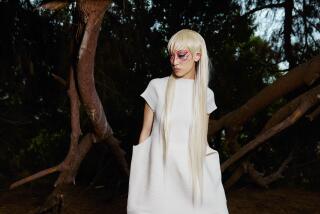An astronaut’s underwear endeavor
CAPE CANAVERAL, FLA. — In what might embarrass less adventurous souls, astronaut Koichi Wakata is returning to Earth with the pairs of underwear he wore for a solid month during his space station stay so that scientists can check them out.
They are experimental high-tech undies, designed in Japan to be odor free.
The Japanese astronaut described his underwear test Thursday as shuttle Endeavour and its crew aimed for touchdown this morning. The astronauts released mini satellites, their final job before today’s planned reentry, and said it was time to come home after more than two weeks aloft.
Wakata has been in orbit for 4 1/2 months.
“I haven’t talked about this underwear to my crew members,” Wakata said in an interview, drawing a big laugh from his six shuttle colleagues. “But I wore them for about a month, and my station crew members never complained for about a month, so I think the experiment went fine.”
The Japanese underwear, called J-Wear, is a new type of anti-bacterial, water-absorbent, odor-eliminating clothing designed for space travel. Aside from underwear, the line includes shirts, pants and socks. Wakata tested all of them during his mission; he had four pairs of the silver-coated underwear, a cross between briefs and boxers.
“We’ll see the results after landing,” Wakata said.
J-Wear is billed as being antistatic and flame retardant, which is especially important for spaceship wear. The cotton-and-polyester clothes are also seamless, making them lighter and more comfortable, according to the Japan Aerospace Exploration Agency. The goal is “comfortable everyday clothes for life in a spaceship.”
NASA’s space station program manager, Mike Suffredini, stressed the importance of testing new products, especially those aimed at improving astronauts’ quality of life. There’s no way to wash clothes in space. Station residents simply ditch dirty outfits, along with other garbage, in cargo ships no longer needed that are sent plunging in flames through the atmosphere.
“Eventually, we’re going to do exploration. We’re going to go to the moon. We’re going to go beyond the moon someday, and little things like this will seem like really, really big things when you’re far away from Mother Earth,” Suffredini told reporters.
More to Read
Sign up for Essential California
The most important California stories and recommendations in your inbox every morning.
You may occasionally receive promotional content from the Los Angeles Times.










